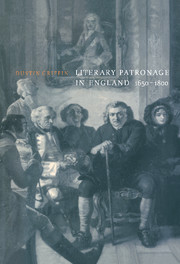Book contents
- Frontmatter
- Contents
- Acknowledgments
- 1 Introduction
- 2 The cultural economics of literary patronage
- 3 The politics of patronage
- 4 John Dryden
- 5 Jonathan Swift
- 6 Alexander Pope
- 7 Edward Young and Richard Savage
- 8 Mary Leapor and Charlotte Lennox
- 9 Samuel Johnson
- 10 The persistence of patronage
- 11 Conclusion
- Bibliography
- Index
11 - Conclusion
Published online by Cambridge University Press: 22 August 2009
- Frontmatter
- Contents
- Acknowledgments
- 1 Introduction
- 2 The cultural economics of literary patronage
- 3 The politics of patronage
- 4 John Dryden
- 5 Jonathan Swift
- 6 Alexander Pope
- 7 Edward Young and Richard Savage
- 8 Mary Leapor and Charlotte Lennox
- 9 Samuel Johnson
- 10 The persistence of patronage
- 11 Conclusion
- Bibliography
- Index
Summary
In his essay on eighteenth-century literary patronage twenty years ago, Paul Korshin raised some fundamental questions about “the social utility and psychology” of patronage: “Is the patronage system … beneficial to the literary climate in a given century? Does the psychology of the patron-client association damage or advance the creative arts?” (“Types of Eighteenth-Century Literary Patronage,” p. 453). Although he does not attempt to provide full answers, he suggests that the system of patronage, often charged with failure, was in fact “surprisingly workable,” and that although it “benefited relatively few writers,” it “survived because it was necessary” (p. 473). It may now be possible to provide more of an answer to Korshin's questions. A complete assessment of the “utility” and “effectiveness” of the patronage system would probably require more knowledge than is now available – about the individual economic circumstances of most writers (not just the well-studied few) and about the precise size and nature of benefactions. But it should be possible to offer some critical assessment of the traditional charges against the system of patronage.
The charge that merit sometimes went unrewarded cannot be wholly rebutted – as the case of Charlotte Lennox shows, though she did not go without patronage altogether. But the number of such cases is probably smaller than we have been told. The loud complaints of Richard Savage and Edward Young seem, upon examination, to be without solid foundation.
- Type
- Chapter
- Information
- Literary Patronage in England, 1650–1800 , pp. 286 - 292Publisher: Cambridge University PressPrint publication year: 1996



